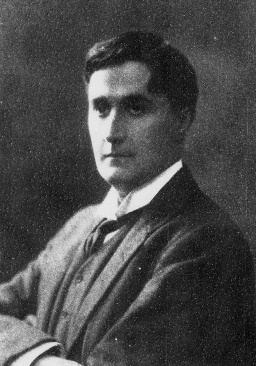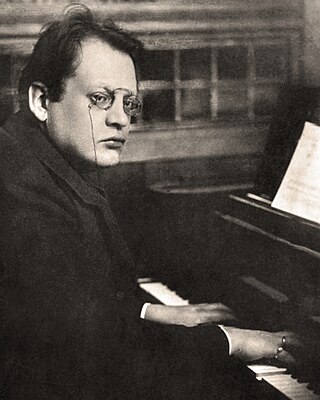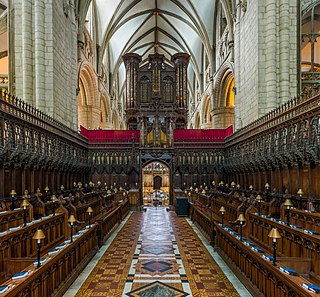
In Western classical music, a motet is mainly a vocal musical composition, of highly diverse form and style, from high medieval music to the present. The motet was one of the pre-eminent polyphonic forms of Renaissance music. According to Margaret Bent, "a piece of music in several parts with words" is as precise a definition of the motet as will serve from the 13th to the late 16th century and beyond. The late 13th-century theorist Johannes de Grocheo believed that the motet was "not to be celebrated in the presence of common people, because they do not notice its subtlety, nor are they delighted in hearing it, but in the presence of the educated and of those who are seeking out subtleties in the arts".

Herbert Norman Howells was an English composer, organist, and teacher, most famous for his large output of Anglican church music.
"Old Hundredth" is a hymn tune in long metre, from the second edition of the Genevan Psalter. It is one of the best known melodies in many occidental Christian musical traditions. The tune is usually attributed to the French composer Louis Bourgeois.
Herbert Whitton Sumsion was an English musician who was organist of Gloucester Cathedral from 1928 to 1967. Through his leadership role with the Three Choirs Festival, Sumsion maintained close associations with major figures in England's 20th-century musical renaissance, including Edward Elgar, Herbert Howells, Gerald Finzi, and Ralph Vaughan Williams. Although Sumsion is known primarily as a cathedral musician, his professional career spanned more than 60 years and encompassed composing, conducting, performing, accompanying, and teaching. His compositions include works for choir and organ, as well as lesser-known chamber and orchestral works.
A coronation anthem is a piece of choral music to accompany the crowning of a monarch. Many composers have written such works. Being anthems, they are not hymns but textured motets requiring a trained choir.

Hodie is a cantata by Ralph Vaughan Williams. Composed between 1953 and 1954, it is the composer's last major choral-orchestral composition, and was premiered under his baton at Worcester Cathedral, as part of the Three Choirs Festival, on 8 September 1954. The piece is dedicated to Herbert Howells. The cantata, in 16 movements, is scored for chorus, boys' choir, organ and orchestra, and features tenor, baritone, and soprano soloists.

The Five Mystical Songs are a musical composition by English composer Ralph Vaughan Williams (1872–1958), written between 1906 and 1911. The work sets four poems by seventeenth-century Welsh poet and Anglican priest George Herbert (1593–1633), from his 1633 collection The Temple: Sacred Poems. While Herbert was a priest, Vaughan Williams himself was an atheist at the time, though this did not prevent his setting of verse of an overtly religious inspiration. The work received its first performance on 14 September 1911, at the Three Choirs Festival in Worcester, with Vaughan Williams conducting.

Psalm 90 is the 90th psalm of the Book of Psalms, beginning in English in the King James Version: "Lord, thou hast been our dwelling place in all generations". In the slightly different numbering system used in the Greek Septuagint and Latin Vulgate translations of the Bible, this psalm is Psalm 89. In Latin, it is known as "Domine refugium tu factus es nobis in generatione et generatione". It is the opening psalm of Book 4 of the psalms. Uniquely among the Psalms, it is attributed to Moses. It is well known for its reference in verse 10 to human life expectancy being 70 or 80 : it is believed that this verse was the influence for the opening words of Abraham Lincoln's Gettysburg Address.

Psalm 149 is the 149th psalm of the Book of Psalms, a hymn as the book's penultimate piece. The first verse of the psalm calls to praise in singing, in English in the King James Version: "Sing a new song unto the Lord". Similar to Psalm 96 and Psalm 98, Psalm 149 calls to praise God in music and dance, because he has chosen his people and helped them to victory. Psalm 149 is also marked by its martial tone: it calls on the people to be ready to fight.

Psalm 126 is the 126th psalm of the Book of Psalms, beginning in English in the King James Version: "When the Lord turned again the captivity of Zion, we were like them that dream". In Latin, it is known as In convertendo Dominus. It is one of the fifteen Songs of Ascent in the Book of Psalms whose opening words in Hebrew are "Shir HaMaalot". In the slightly different numbering system used in the Greek Septuagint version of the Bible and in the Latin Vulgate, this psalm is Psalm 125.

Psalm 93 is the 93rd psalm of the Book of Psalms, beginning in English in the King James Version: "The LORD reigneth, he is clothed with majesty". The Latin wording is Dominus regnavit, decorem indutus est. The Book of Psalms is part of the Hebrew Bible and the Christian Old Testament. In the slightly different numbering system of the Greek Septuagint and Latin Vulgate versions of the Bible, this psalm is Psalm 92. It is the first of a series of psalms which are called royal psalms as they praise God as King.

Psalm 138 is the 138th psalm of the Book of Psalms, beginning in English in the King James Version: "I will praise thee with my whole heart". In Latin, it is known as "Confitebor tibi Domine in toto corde meo". The psalm is a hymn psalm.

Psalm 122 is the 122nd psalm of the Book of Psalms, beginning in English in the King James Version: "I was glad" and in Latin entitled Laetatus sum. It is attributed to King David and one of the fifteen psalms described as A song of ascents. Its title, I was glad, is reflected in a number of choral introits by various composers.

Psalm 47 is the 47th psalm of the Book of Psalms, beginning in English in the King James Version: "O clap your hands". The Book of Psalms is the third section of the Hebrew Bible, and a book of the Christian Old Testament. In the slightly different numbering system used in the Greek Septuagint and Latin Vulgate translations of the Bible, this psalm is Psalm 46. In Latin, it is known as "Omnes gentes plaudite manibus". The psalm is a hymn psalm. It is one of twelve psalms attributed to the sons of Korah, and one of fifty-five psalms addressed to the "Chief Musician" or "Conductor".
Psalm 86 is the 86th psalm of the Book of Psalms, beginning in English in the King James Version: "Bow down thine ear, O Lord, hear me: for I am poor and needy". In the slightly different numbering system used in the Greek Septuagint and Latin Vulgate translations of the Bible, this psalm is Psalm 85. In Latin, it is known as "Inclina Domine". It is attributed to David.

Der 100. Psalm, Op. 106, is a composition in four movements by Max Reger in D major for mixed choir and orchestra, a late Romantic setting of Psalm 100. Reger began composing the work in 1908 for the 350th anniversary of Jena University. The occasion was celebrated that year with the premiere of Part I, conducted by Fritz Stein on 31 July. Reger completed the composition in 1909. It was published that year and premiered simultaneously on 23 February 1910 in Chemnitz, conducted by the composer, and in Breslau, conducted by Georg Dohrn.

In Exile is a motet by Herbert Sumsion, who was for decades organist at Gloucester Cathedral. He set in 1981 a biblical text from Psalm 137 in English, beginning "By the waters of Babylon", scored for double choir a cappella. The motet was published by Basil Ramsey.
O clap your hands is an anthem in English for choir and organ by John Rutter. He composed the setting of verses from Psalm 47 in 1973 for a four-part choir and organ, and also made a version with orchestra. It was first published in 1973. Later, Rutter included it in Psalmfest, a collection of nine psalm settings.
O clap your hands are the first words of Psalm 47.













